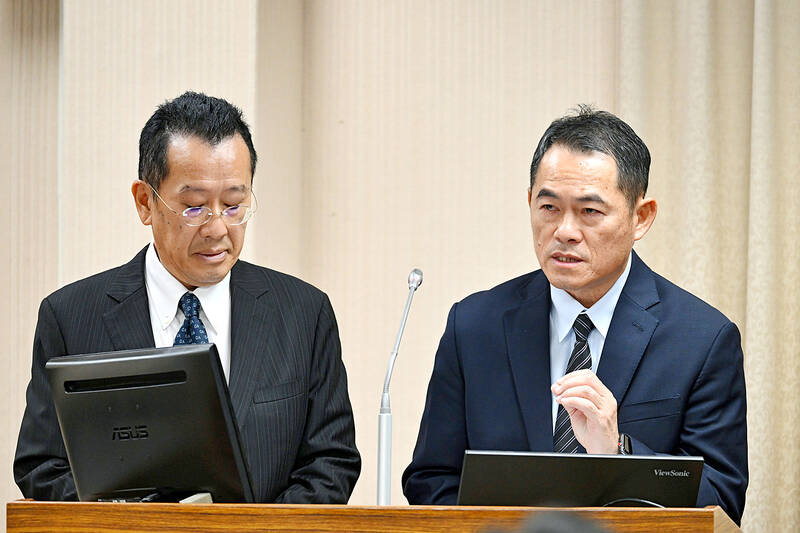The first batch of Harpoon missiles purchased from the US would be delivered around the end of this year to provide critical combat power for the Littoral Combatant Command (LCC), the navy said yesterday.
Following the establishment of the LCC on Jan. 1, the first batch of the 400 Harpoon anti-ship missiles would be delivered around the end of this year on schedule, navy Chief of Staff Vice Admiral Chiu Chun-jung (邱俊榮) told a meeting of the legislature’s Foreign Affairs and National Defense Committee.
The LCC is thus expected to start operating in July next year, he said, adding that the navy would collaborate with the Ministry of National Defense to facilitate the adoption of the missiles, which would be critical combat equipment under the LCC’s jurisdiction.

Photo: Chen Yi-kuan, Taipei Times
Drones and uncrewed vessels would also be incorporated into the LCC system for littoral strikes and multidomain interception, he said, adding that their manufacturing has started.
Asked whether the timeline for the completion of the indigenous Hai Kun (海鯤) submarine was “overly optimistic,” Chiu agreed the initially planned six months for the testing phase was insufficient.
However, he added that he was confident they would be able to complete the test launch of training torpedoes from the submarine before the torpedo verification system leased from the US expires in May next year.
The submarine was built on schedule, but more time is needed for the testing, Chiu said, adding that all the equipment test reports met the navy’s criteria.
Minister of National Defense Wellington Koo (顧立雄) said that real-world challenges, such as difficulties in obtaining relevant equipment and technical support from the original manufacturer, were not fully understood when the timeline was set.
However, safety and quality would be prioritized in subsequent sea acceptance tests, he said.
Asked whether the Hai Kun uses a main engine typically for trucks or buses, Chiu said the designer of the engine and power source went through a selection process and has an export license.
CSBC Corp, Taiwan (台船) chairman Chen Cheng-hung (陳政宏) added that the engine was manufactured by a diesel-engine powerhouse, and that it would submit supporting documents to the legislature.
Asked whether penalties would be meted out if the submarine cannot be delivered to the navy next month as scheduled, Koo and the ministry’s Procurement Office Director Chao Ya-ping (趙亞平) said the daily fine would be about NT$190,000 (US$6,199).
The accumulated amount would be capped at about NT$4 billion, 20 percent of the NT$19.3 billion cost for building the submarine, they said.
Asked whether the verification equipment for the torpedo test must be returned to the US even if the test launch fails to be completed by May, Chiu said the navy would do its best to meet the goal.
It would apply to extend the lease period if needed, he said, adding that whether the equipment must be returned to the US could be negotiated.

PREPAREDNESS: Given the difficulty of importing ammunition during wartime, the Ministry of National Defense said it would prioritize ‘coproduction’ partnerships A newly formed unit of the Marine Corps tasked with land-based security operations has recently replaced its aging, domestically produced rifles with more advanced, US-made M4A1 rifles, a source said yesterday. The unnamed source familiar with the matter said the First Security Battalion of the Marine Corps’ Air Defense and Base Guard Group has replaced its older T65K2 rifles, which have been in service since the late 1980s, with the newly received M4A1s. The source did not say exactly when the upgrade took place or how many M4A1s were issued to the battalion. The confirmation came after Chinese-language media reported

A Ministry of Foreign Affairs official yesterday said that a delegation that visited China for an APEC meeting did not receive any kind of treatment that downgraded Taiwan’s sovereignty. Department of International Organizations Director-General Jonathan Sun (孫儉元) said that he and a group of ministry officials visited Shenzhen, China, to attend the APEC Informal Senior Officials’ Meeting last month. The trip went “smoothly and safely” for all Taiwanese delegates, as the Chinese side arranged the trip in accordance with long-standing practices, Sun said at the ministry’s weekly briefing. The Taiwanese group did not encounter any political suppression, he said. Sun made the remarks when

The Taiwanese passport ranked 33rd in a global listing of passports by convenience this month, rising three places from last month’s ranking, but matching its position in January last year. The Henley Passport Index, an international ranking of passports by the number of designations its holder can travel to without a visa, showed that the Taiwan passport enables holders to travel to 139 countries and territories without a visa. Singapore’s passport was ranked the most powerful with visa-free access to 192 destinations out of 227, according to the index published on Tuesday by UK-based migration investment consultancy firm Henley and Partners. Japan’s and

BROAD AGREEMENT: The two are nearing a trade deal to reduce Taiwan’s tariff to 15% and a commitment for TSMC to build five more fabs, a ‘New York Times’ report said Taiwan and the US have reached a broad consensus on a trade deal, the Executive Yuan’s Office of Trade Negotiations said yesterday, after a report said that Washington is set to reduce Taiwan’s tariff rate to 15 percent. The New York Times on Monday reported that the two nations are nearing a trade deal to reduce Taiwan’s tariff rate to 15 percent and commit Taiwan Semiconductor Manufacturing Co (TSMC, 台積電) to building at least five more facilities in the US. “The agreement, which has been under negotiation for months, is being legally scrubbed and could be announced this month,” the paper said,